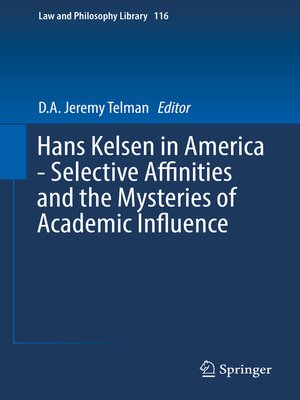Hans Kelsen in America--Selective Affinities and the Mysteries of Academic Influence
ebook ∣ Law and Philosophy Library
By D.A. Jeremy Telman

Sign up to save your library
With an OverDrive account, you can save your favorite libraries for at-a-glance information about availability. Find out more about OverDrive accounts.
Find this title in Libby, the library reading app by OverDrive.



Search for a digital library with this title
Title found at these libraries:
| Library Name | Distance |
|---|---|
| Loading... |
This volume explores the reasons for Hans Kelsen's
lack of influence in the United States and proposes ways in which Kelsen's
approach to law, philosophy, and political, democratic, and international
relations theory could be relevant to current debates within the U.S. academy
in those areas. Along the way, the volume examines Kelsen's relationship and
often hidden influences on other members of the mid-century Central European
émigré community whose work helped shape twentieth-century social science in the
United States. The book includes major
contributions to the history of ideas and to the sociology of the professions
in the U.S. academy in the twentieth century. Each section of the volume
explores a different aspect of the puzzle of the neglect of Kelsen's work in
various disciplinary and national settings.
Part I provides reconstructions of Kelsen's legal theory and defends
that theory against negative assessments in Anglo-American jurisprudence. Part II focusesboth on Kelsen's theoretical
views on international law and his practical involvement in the post-war
development of international criminal law. Part III addresses Kelsen's theories of
democracy and justice while placing him in dialogue with other major
twentieth-century thinkers, including two fellow émigré scholars, Leo Strauss
and Albert Ehrenzweig. Part IV explores Kelsen's intellectual legacies through
European and American perspectives on the interaction of Kelsen's theoretical
approach to law and national legal traditions in the United States and Germany.
Each contribution features a particular
applications of Kelsen's approach to doctrinal and interpretive issues
currently of interest in the legal academy.
The volume concludes with two chapters on the nature of Kelsen's legal
theory as an instance of modernism.







